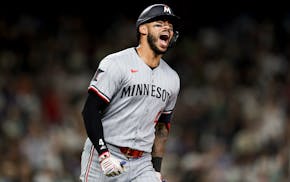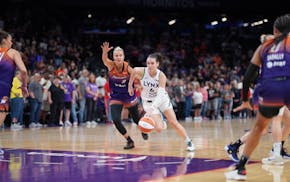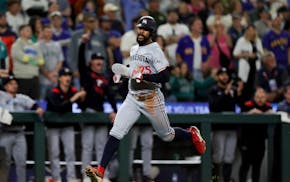DETROIT – On Thursday, Anthony Edwards had a lot to say following a 15-point night against the Celtics, when the Timberwolves star held court after the game to talk about how double teams were affecting his ability to score and the amount of fun he was having playing basketball.
On Saturday, Edwards scored a career-high 53 points, but his team lost 119-105 to an improving but still middling Pistons team. Edwards had nothing to say after this game, as he declined to speak with reporters.
But the Wolves' defeated body language and lack of energy at various points said more than anyone could say verbally. After 34 games, the Wolves are back to .500 at 17-17 and have lost three games in a row.
Their starting lineup is a mess, and it has been for a good chunk of the season. They weren't the only reason the Wolves lost — their blended second unit didn't score a point for nearly five minutes while Edwards rested in the second quarter — but after the game, coach Chris Finch said the Wolves were "doomed by a poor start" in which the Wolves came out flat defensively and were only in the game early because of Edwards' shotmaking.
When the Minnesota Star Tribune asked him for the second time in three weeks if he was considering a change to the starting lineup, Finch said he was not.
"You guys ask me this question all the time," Finch said. "If I felt that the magic bullet was changing the starting lineup, I would've done that already. I don't think I'm being particularly stubborn. There's a chain reaction to everything you do. There are other combinations and things that go on on the floor that are just as important if not more so than the starting lineup."
The start of the game wasn't the only problem with the starting unit. They also started the third quarter by allowing a 12-point deficit to balloon to 21 by the time Finch made his first substitution. Cade Cunningham had 40 points for Detroit while former Wolves guard Malik Beasley had 23 off the bench.
Finch sat veterans Mike Conley and Rudy Gobert for long stretches of the second half as he turned to the bench and Edwards for a comeback that never came. Because Edwards declined to speak, it left Conley and Gobert to answer questions about the state of the team and their individual play. Conley didn't score while Gobert opened with three turnovers in the first quarter and finished with six points and six rebounds. There was concern and urgency in their words.
"Right now, it's just like an off timing with the way we've been playing," Conley said. "We are inconsistent with the approach to the game. When we come out there, there's one game we have a lot of energy. Other games we don't. One game we compete a bit more than others. We have to find a balance for that starting unit that allows us to start these games off the way we're capable of starting them off. … A lot of it has to do quite frankly, our willingness, to run for each other, space for each other and commit on the offensive end."
Gobert emphasized that point multiple times, saying the starting unit wasn't trusting each other, making the easy plays.
"When it gets bad is if you lose trust in the team, if you lose trust in who we are that's when it gets bad," Gobert said. "You got to keep putting in the work, keep trusting who we are and don't let any type of panic or any type of doubt affect who we are. That's what I've been doing my whole career."
As for their individual struggles, Gobert gave his usual answer of recommitting to the work; Finch said it was "all about his defense" for Gobert.
"He has to be a great presence in anchoring our defense at the rim," Finch said. "Mike we need him to be aggressive at the start of games. I'm going to have to call plays to direct the ball back into his hands. That's on me there."
BOXSCORE: Detroit 119, Wolves 105
Conley said he was focusing his efforts more on trying to get teammates kickstarted than he was himself. "Trying to pour everything into these guys right now as far as helping each individual guy getting through whatever they're getting through," he said. "Trying to get this team headed down the right path and not letting us fall into some really bad habits that could lead us to a tough season. I'm still focused on myself here and there, but for the most part, I feel like I'll be fine. … I've played long enough to figure that out."
Will the team, and specifically, the starting lineup, ever figure it out? This far into the season, there are more reasons to think it won't than it will. Their inconsistent body language and effort suggest they think so, too.
"We can be a lot better with our body language," Conley said. "Our effort is just too hit-or-miss. When things are good, you get a little bit more. When things go south a little bit, you find guys hold their head a little more, we don't get back as quickly or we complain about a call or whatever it may be. All those things are habits that we have to find ways to break, find ways to get through to get to the next play and just be better."

Twins rally against Mariners with three last-chance runs and a bunch more in the 10th

Playing without their star, Lynx keep things perfect with comeback at Phoenix

Buxton returns to top of Twins lineup and to his post in center field
